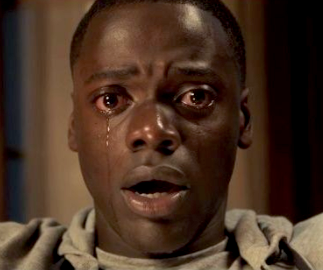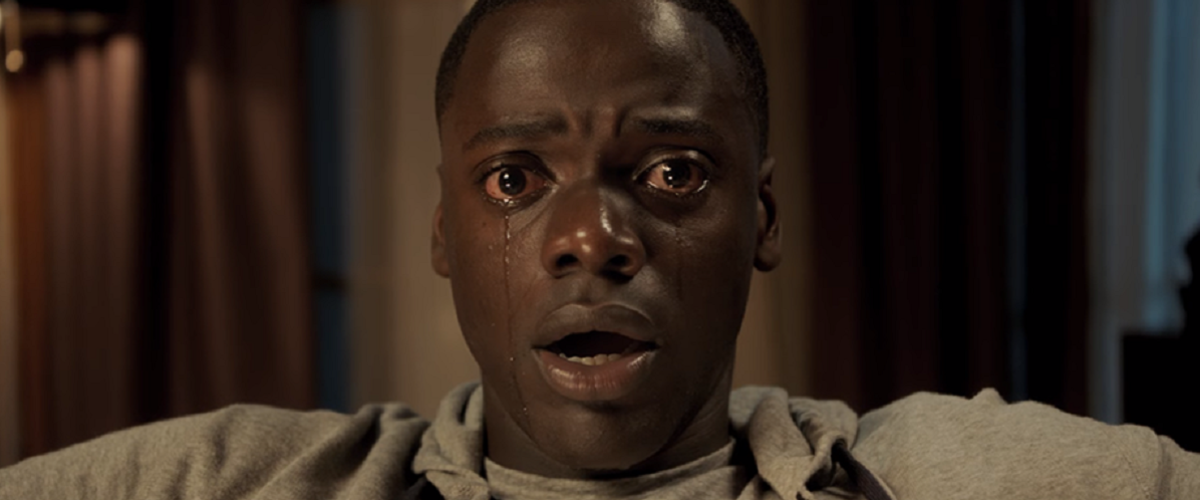by Chris Feil
 From its long-take opening to its satisfying conclusion, comedian Jordan Peele’s directorial debut Get Out is one hell of a delight. Photographer Chris (Daniel Kaluuya) is heading to the country family home of his girlfriend Rose (Girls’ Allison Williams), an extra uneasy experience given that he is her first black boyfriend. Her parents (Bradley Whitford and Catherine Keener) are woodsy liberals, quasi-intellectuals who love Obama and are just on the performative side of accommodating.
From its long-take opening to its satisfying conclusion, comedian Jordan Peele’s directorial debut Get Out is one hell of a delight. Photographer Chris (Daniel Kaluuya) is heading to the country family home of his girlfriend Rose (Girls’ Allison Williams), an extra uneasy experience given that he is her first black boyfriend. Her parents (Bradley Whitford and Catherine Keener) are woodsy liberals, quasi-intellectuals who love Obama and are just on the performative side of accommodating.
But it’s best to let the rest of Get Out reveal itself: you’ll want to know as little as possible before strapping into this ride...
Not that this is a genre film that relies all that much on twists to be spoiled, but its lightning rod satire is best unpacked first through its devilishly entertaining 103 minutes instead of through the thinkpieces that have already dropped before the film has.
The horror comedy has been defined by Kevin Williamson’s brand of irony and self-awareness since Scream debuted twenty years ago, and to diminishing returns. There may be ample timely satire here, but Get Out isn’t delivered with a wink and is all the better for its directness. While the film isn’t the game changer that Scream was, it does succeed in delivering on both sides of its hilarious and creepy coin in equal measure where its contemporaries have faltered. Peele not only balances the tricky tones coherently, but consistently ups the ante to thrilling results. You’ll want to experience this finale with a big crowd.

Peele benefits from quite a strong ensemble that mines the material to full effect. Kaluuya, perhaps most familiar as Emily Blunt’s partner in Sicario, is charismatic and specific in Chris’s sly humor and rationality. The film taps into something in Catherine Keener’s persona that has been previously unmined and relishes doing so, while it amps up Whitford’s smarmier impulses to cringe-inducing laughs. LilRel Howery is the comedy standout in the stock friend role while Betty Gabriel unnerves as vacant maid Georgina.
The discomfort of African Americans in white surroundings and the relationship between ingrained racism and performative assurances of non-racism are examined here without easy conclusions, but the experience of the film is still rousingly cathartic and incisive. Peele’s exacting delivery is rooted in the honest nature of comedy, with even the more mechanical, less inventive moments of the film (like the clunky clarifications of the whats and whys of evildoings) easy to forgive thanks to such an inspired concept so effectively executed. It’s a passionate debut in both its social reflection and drive to thrill you, as thoughtful as any mainstream entertainment currently in theatres.
A daring bit of genre filmmaking, Get Out delivers on more levels than its contemporaries and confidently so. Hopefully Jordan Peele will get the credit he’s due here.
Grade: B+